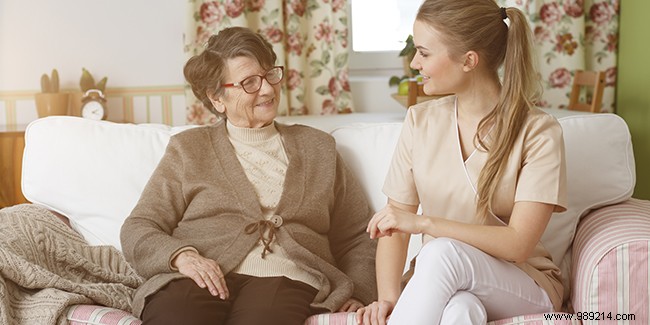
A companion for seniors designates a person, usually a woman, who intervenes in the home of an elderly person, on the one hand to provide him with support in his acts of daily life but, on the other hand, and above all, to fight against his isolation. The role of a companion is indeed to ensure a warm and friendly presence with seniors, especially the most alone or who no longer have the possibility of having a normal social life due to illness or a disability in particular.
The function of companion for seniors is a profession that is part of home help and support services in the same way as, for example, home help or social life assistant. Most of these jobs take place in the homes of elderly people who no longer have the necessary skills to perform certain acts of daily life on their own, such as preparing meals, dressing, shopping, cleaning, etc. A companion for seniors can thus intervene with an elderly person to help them prepare their meals, go shopping, or even maintain their home. She may also be required to stay at the home of an elderly person at night to ensure a vigil.
If this job is called "companion lady", it is because it is mostly exercised by women, like most professions in home help and support services, and in the whole care , by the way.
Compared to the services provided by a home helper or a social life assistant, the role of a senior companion is mainly, as her name suggests, to be present alongside the person she accompanies. at home, and sometimes in a retirement home or in a residential facility for dependent elderly people (Ehpad), to ensure that she is not alone and that she does not suffer from loneliness.
Isolation is indeed a phenomenon that affects a large number of elderly people, almost a quarter of people over 75, i.e. around 5 million people in France, as indicated by the Ministry of Solidarity and Health.
A senior lady companion is truly a day-to-day presence for seniors. It allows them to maintain a social link with an outside person. This is why companions most often work with elderly people who can no longer leave their homes without help due to a disability, serious mobility problems, or even suffering from an illness such as that of Alzheimer's, for example, which makes them lose all their bearings.
A companion can also play an important role for elderly people who are coming out of hospital and who need day-to-day help, but also who need a comforting presence.
A companion is also very useful for seniors whose families are far away and whose visits are rare. It can thus allow you to have a person at your side to talk to, with whom to exchange, or even to do activities.
Given her role, which goes beyond that of helping an elderly person at home with their daily activities (dressing, preparing meals, shopping, cleaning, etc.), a lady companion for seniors is first and foremost there. to ensure that the senior she visits does not feel alone, that he or she continues to maintain social relationships, in short, she helps to preserve their well-being and good psychological health.
To exercise the profession of companion, no specific diploma is required even if most often it is holders of a State diploma in the social and family assistance sector who engage in this profession.
A companion must above all demonstrate certain qualities necessary for the requirements of her profession. She must therefore have a keen sense of listening to be able to identify and meet the needs and expectations of the senior she accompanies.
The profession of companion also requires a lot of human warmth and empathy to properly identify what an elderly person who needs their services is feeling and to make their environment a pleasant, cheerful and pleasant place.
A companion must also be dynamic, and therefore have a good physical condition, given the diversity of tasks that she may be required to perform for a senior in her home.
Finally, a companion often turns into a confidante for the elderly person she is helping. She must therefore exercise discretion in her job.
Most of the time, companions are employed by structures that should therefore be contacted if one wishes to recruit this type of professional to intervene in the homes of the elderly.
A companion may thus be an employee of an association, a local authority, a medical establishment such as a hospital or a clinic, a home or a residence for the elderly, or even a company. home help service.
As a private employer, a senior also has the possibility of directly recruiting a companion whom he knows through relatives, by word of mouth, or through classified ads.